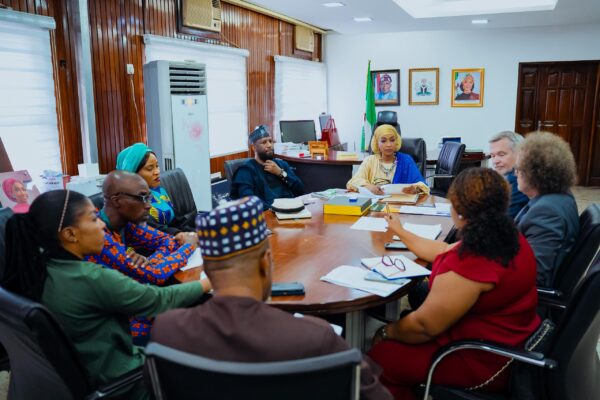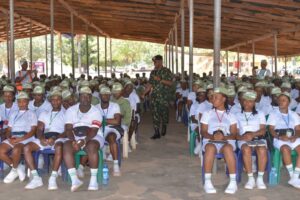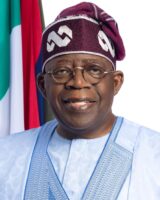The Federal Ministry of Art, Culture, Tourism and the Creative Economy on Tuesday welcomed a high-level delegation from the European Union to Nigeria and ECOWAS, led by Ambassador Gautier Mignot.
The courtesy visit, hosted by the Minister, Hannatu Musa Musawa, Esq., marked the first official meeting with the newly appointed EU Head of Delegation and opened the door to an expansive cultural and economic collaboration between Nigeria and the EU.
This engagement reaffirmed Nigeria’s commitment to strengthening global cultural diplomacy and unlocking the economic potential of its creative industries — all in alignment with the Renewed Hope Agenda of His Excellency, President Bola Ahmed Tinubu, GCFR.
A Shared Vision for Growth Through Culture
Welcoming the EU delegation, Honourable Minister Musawa emphasized culture as a tool not only for national pride but for economic growth, peacebuilding, and international cooperation. She described the visit as “a timely and forward-looking engagement” that resonates with the Ministry’s current agenda — one rooted in innovation, inclusivity, and global relevance.
Conversations between both parties spanned museum partnerships, creative industry investments, and cultural policy alignment. The EU delegation commended Nigeria’s remarkable global impact in film, music, fashion, and cultural storytelling, and reaffirmed their commitment to strengthening bilateral ties through capacity-building and funding support.
Introducing the Creative Economy Framework
One of the key highlights of the meeting was the presentation of the Ministry’s flagship policy guide, THE CREATIVE ECONOMY — a publication designed to map Nigeria’s priority sectors, align interventions with national goals, and unlock investment potential across the creative and tourism value chains.
The presentation was made by Mr. Faiz Imam, Chief Principal Adviser to the Honourable Minister, who emphasized the urgency of harmonised communication and coordination between stakeholders, both domestic and international, in order to deliver on the Ministry’s strategic outcomes. He noted that streamlined collaboration with institutions such as UNESCO, the EU, and development partners will significantly improve project efficiency and accelerate national deliverables.
Hon. Minister’s Vision: Delivering Jobs and Economic Transformation
Further amplifying the Honourable Minister’s long-term strategy, Ms. Moriam Ajaga, Special Adviser to the President on Art & Culture (Office of the Honourable Minister), reiterated the goals embedded in Minister Musawa’s 8-Point Agenda. These include:
• Delivering 2 Million Jobs across the cultural, tourism, and creative sectors.
• Contributing $100 billion to Nigeria’s $1 trillion economy target by the year 2030.
Ms. Ajaga emphasized that the Honourable Minister’s focus is on building sustainable structures — not just initiatives — that can transform Nigeria’s creative capital into measurable development impact, while also supporting grassroots communities and repositioning Nigeria globally.
Read Also
- Inbound Tourism Emerges as Nigeria’s Pathway to Global Visibility, Unity, Prosperity - Minister
- NTDA, FAAN Move to Restore Tourism Information Desks at Airports
- NTDA DG, Ola Awakan Advocates Creative Platforms as Tourism Drivers
- Obasa Games 2025: Preliminaries Conclude, Lagos Students Gear Up for Grand Finale
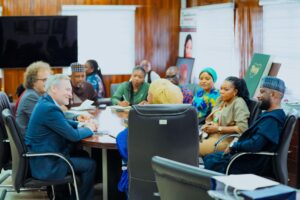
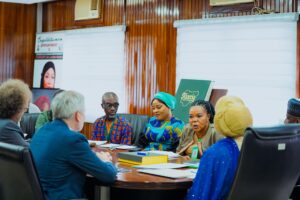
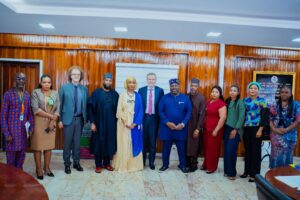
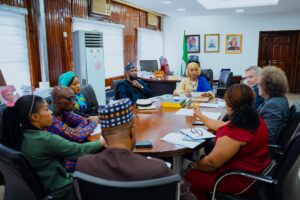
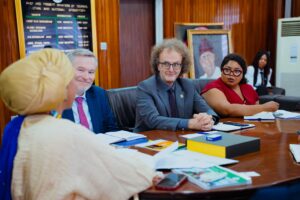
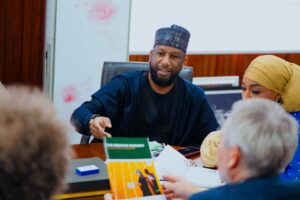
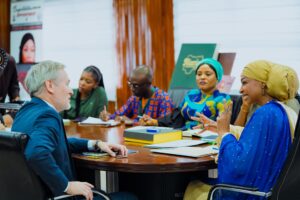
Key EU Announcements and Joint Commitments
The EU delegation unveiled a number of ongoing and upcoming interventions, including:
• A €20 million initiative to foster partnerships between Nigerian and European museums.
• Support for film festivals, digital creative hubs, and youth training.
• Grassroots cultural development initiatives in partnership with Goethe-Institut, Institut Français, and other cultural organisations.
Together with the Ministry, both parties agreed to coordinate efforts through unified engagement frameworks that ensure alignment with national policies and sustainable outcomes.
Resolutions and Next Steps
The meeting concluded with several forward-looking action points:
1. Re-engaging with UNESCO to resolve pending project delays and form a new steering committee.
2. Advancing the development of a national Unity Song — featuring major Nigerian artists — to promote cohesion and peace.
3. Organising a landmark Creative Economy Summit to attract investment, share insights, and unify sectoral voices.
4. Strengthening cultural data mapping to guide planning and measure impact.
5. Supporting regional museum and festival launches, particularly at the grassroots level.
A Defining Engagement with Lasting Impact
In her closing remarks, Honourable Minister Hannatu Musa Musawa, Esq. described the meeting as “deeply rewarding, collaborative, and inspiring,” stating that it demonstrated the growing international confidence in Nigeria’s cultural and creative sectors.
“Culture is our soul, but it is also our strength. With partners like the European Union, we are transforming our creative identity into an engine of economic prosperity, national unity, and global leadership,” she said.
She expressed profound appreciation to Mr. Faiz Imam, Chief Principal Adviser, and Ms. Moriam Ajaga, Special Adviser to the President on Art & Culture, for their critical roles in articulating the Ministry’s vision and delivering actionable frameworks that continue to drive results.
The engagement is a major boost to the strategic objectives of the Federal Ministry of Art, Culture, Tourism and the Creative Economy and aligns firmly with President Tinubu’s Renewed Hope Agenda, which prioritises economic inclusion, cultural diplomacy, and innovation-driven development for all Nigerians.

